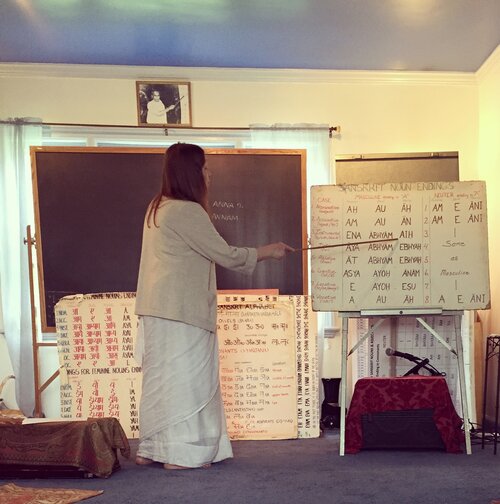The vast body of literature in classical Sanskrit encompasses all branches of knowledge and culture, and the Ṛig-Veda (in Vedic Sanskrit) is widely acknowledged as the oldest written record of mankind. This is a legacy felt to belong to the entire human race.
The love of Sanskrit here at the Ashram was inspired by founder Shri Brahmananda Sarasvati himself, a recognized master of the language. In his teaching he prominently used the medium of Sanskrit, emphasizing the chanting and study of mantras, hymns and scriptural texts as well as the study of the language itself as "science of vibration."
Scriptural studies at Ananda Ashram focus on important texts that form the foundation of the science of Yoga and the universal, non-dualistic Vedanta philosophy. Included are the Bhagavad Gītā, the Yoga Sūtras, some of the major Upanishads, works by Shankaracharya and other classical, Vedic and traditional sources. They are concerned with truths that are independent of time, place, culture or society, found to be deeply connected to the universal experiences encountered in the process of meditation.
The texts and mantras come to life through chanting, word-by-word translation, reading of commentary, and discussion of their timeless relevance. The combination of a meditative approach with clarification of the philosophical context as well as grammatical explanation helps bring out the inner meaning of the texts, including their significance for healing and self realization.
These scriptural sessions are scheduled most mornings beginning at 9:45 am. Taught by Ashram teachers and open to all, tuition is by donation.

Open Sanskrit Language Classes - Ongoing
WINTER 2024/25
Mon - Sat 10:45 am
Class length ranging from 45 to 60 minutes, longer on Wednesdays
with Bharati Devi - Beginners to Intermed./Advanced Level: Mon, Wed, Fri, Sat
with Krishnā Devi - Chanting Verbs & Nouns: Tue
with Tara Devi - Beginners Level: Thu
Tuition: By open donation / included in Ashram overnight guest rate
Inquire about Schedule Changes as of February 10, 2025.
Instruction in the Sanskrit language is offered for resident students, guests and the interested public. Knowledge of Sanskrit grammar as "science of vibration" gives a genuine understanding of the language and more independent access to the meaning of the ancient scriptures. It is taught here through the unique, interactive method developed by Ashram Founder Shri Brahmananda Sarasvati. With its emphasis on chanting and rhythm, this method also functions as a meditative discipline and an energizing holistic therapy.
Classes may include chanting of the Sanskrit alphabet and word forms, reading and writing of the devanāgarī script, grammar, translation, philosophy/psychology of language and conversational exercises. At least the first part of each session is of introductory or general nature, with no prior knowledge required. Depending on the level of the participants, the second part of class may be intermediate-advanced level.
Director of the School of Sanskrit is Bharati Devi.
The ISEWU admits students of any race, color and national or ethnic origin.
The Significance of Sanskrit
.jpg)
Sanskrit is one of the oldest surviving members of the Indo-European family of languages, characterized by its uninterrupted continuity for at least the last six thousand years. It is not confined to any region, any religion, any one philosophical school or race or caste.
It has served as a vehicle for all kinds of literary, cultural, spiritual, intellectual, philosophical and scientific expressions of humankind throughout the ages. It continues to serve as a medium of expression including day-to-day conversation and modern aesthetic creations. It has also served as a most effective medium for a dialogue of cordial understanding between the East and the West for at least the last two centuries. Sanskrit represents not merely a language, but a distinct tradition that brings us closer to one another linguistically, philosophically, culturally as well as spiritually.

